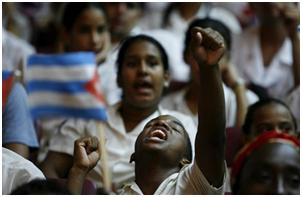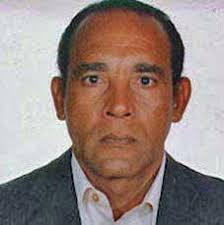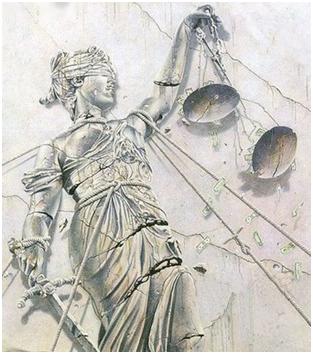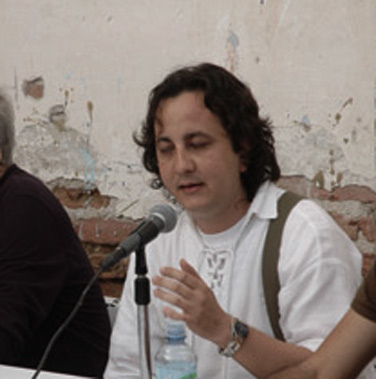The doctor Oleyvis García, 38, is convinced that God heard her repeated prayers. “Every night I prayed to the Lord, asking him to free my husband, said García, wearing faded light-blue shorts and a shirt in the colors of the Spanish football team.
Oleyvis lives in a dusty half-paved village street. Her home is over a doctor’s office. Nothing fancy. Cheap wood furniture in a narrow room painted a dull white color.
Until March 19, 2003, her husband, Pablo Pacheco Avila, 40, a freelance journalist, also lived there. That day, eleven police patrol cars and half a dozen cars from the State Security raided their house and arrested Pacheco.
Until today’s sun. Pablo Pacheco spent 7 years and 4 months behind bars. His crime, writing without permission what he thought should be the future for Cuba. Today all that is ancient history.
International pressure, the death of Orlando Zapata, the marches of the Ladies in White, the hunger strike of Guillermo Fariñas, and mediation by the Spanish Foreign Minister Miguel Ángel Moratinos, the Cuban Catholic Church and the good will of the General Raul Castro’s government, have allowed the 52 prisoners of the Black Spring to be freed.
Pablo Pacheco will be one of the first. On a blazingly sunny afternoon with no water on his cellblock to wash himself, the penal authorities called him into a small room. He had a phone call.
On the other end of the line, with his voice neutral and cordial, was Cardinal Jaime Ortega. In a few minutes, the Cardinal told him that if he wished, he could leave for Spain. Without conditions and with his family.
According to Pacheco, the highest representative of the church on the island, made it very clear that in any case he could return to his country when he wished. Pacheco agreed to leave his country.
Above all, he was thinking of the future of his son Jimmy who is 12. It was his son who suffered most from his unjust imprisonment. Oleyvis, his mother, always meant to hide the truth from him.
“I told him his father was studying, or traveling, that he would be back home soon,” Oleyvis related. The lie had short legs. The boy sense that something wasn’t right.
Every three months he carried, with his mother, a huge burlap bag with over 20 pounds of provisions, on a journey of over 200 miles to the Agüica prison in Matanzas province, where Pacheco was first held.
One morning, looking at him with his café con leche colored eyes, Jimmy asked his father, “Papá, why are you always surrounded by men dressed in olive green?”
He was seven. Pacheco knew he couldn’t lie to him, “Jimmy, your father is in prison for wanting a better future for all Cubans. My son, prison is not a dishonor when a person is in prison for a just motive,” Pablo told him, while giving him examples of famous patriots who had been in prison, like José Martí.
“That’s true, Papá, I’m proud of you,” he answered in a strong voice. Jimmy grew up without his father’s advice. He wanted to tell him that the girl in the last desk in the classroom stuck up for him. How much he missed not being able to go to the beach with him. Play baseball and football, his favorite sports. Climb a mango tree together, or hunt quail.
During these seven long years Oleyvis was both mother and father. In Cuba the family also suffers from the imprisonment of their loved ones. The long journeys to the prison, the lack of money, the loneliness and constant tension about their future, have prematurely aged Dr. García.
On the left side of her bed there has been an empty space for a long time. With wet eyes, Oleyvis thinks that Madrid will be a good place to rebuild their marriage and family life.
Before we leave, she asks us not to forget to thank, in her name, all the people who made the release of her husband possible. The friends and neighbors who always supported and encouraged her. And God, who heard her prayers.
Iván García y Lali Kazás

 Exactly how do minors become affiliated with the Committees for the Defense of the Revolution?
Exactly how do minors become affiliated with the Committees for the Defense of the Revolution? However, I can assure you that less than 1% of the members of the CDR know the rules of the organization. The important thing is your commitment, not what you are committing to. They don’t care if you consent to the rules, nor if you comply with the obligations assumed.
However, I can assure you that less than 1% of the members of the CDR know the rules of the organization. The important thing is your commitment, not what you are committing to. They don’t care if you consent to the rules, nor if you comply with the obligations assumed.


 The establishment of an association in Cuba requires authorization from the Ministry of Justice. It lies in its discretion to allow or disallow a group of citizens to exercise its constitutional right of freedom of association. Its decision depends on an investigation of the legality and appropriateness.
The establishment of an association in Cuba requires authorization from the Ministry of Justice. It lies in its discretion to allow or disallow a group of citizens to exercise its constitutional right of freedom of association. Its decision depends on an investigation of the legality and appropriateness. It’s as if all the clocks had been stopped. In unison, the same day at the same time. The unease is widespread around the Cuban political prisoners and their families.
It’s as if all the clocks had been stopped. In unison, the same day at the same time. The unease is widespread around the Cuban political prisoners and their families. After a group is formed, it submits an application to the Registrar of Associations of the Ministry of Justice for a certificate stating that no other official or non-governmental organization (NGO) exists in the country with the same name or the same purposes as the new association. This certificate accompanies the rest of the documents for the application for the charter.
After a group is formed, it submits an application to the Registrar of Associations of the Ministry of Justice for a certificate stating that no other official or non-governmental organization (NGO) exists in the country with the same name or the same purposes as the new association. This certificate accompanies the rest of the documents for the application for the charter.